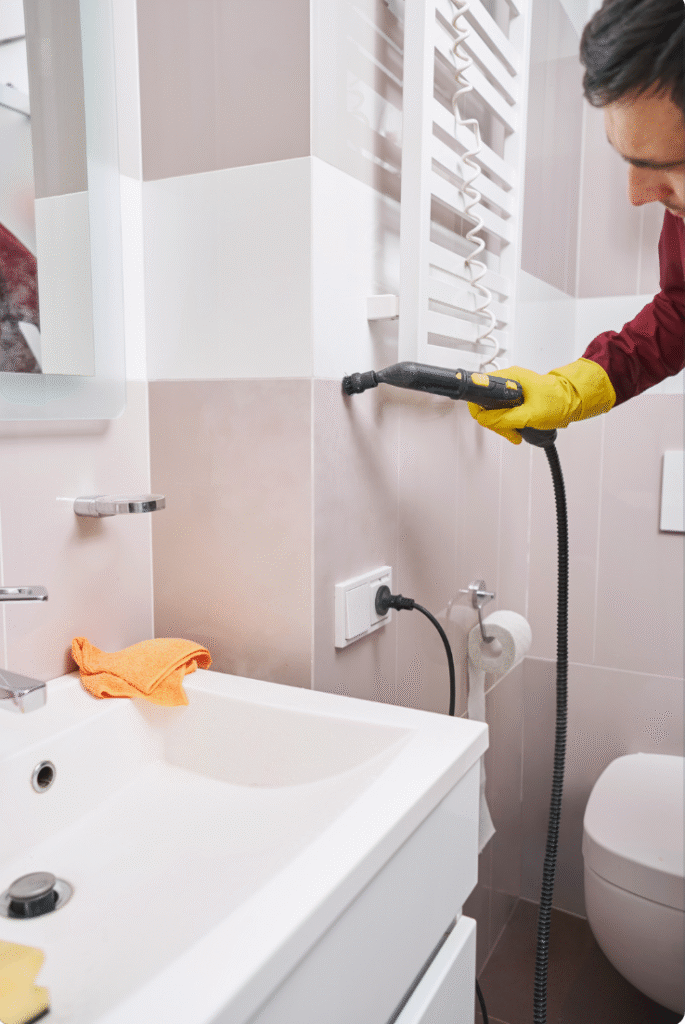At home, tiled floors are usually regularly cleaned, however, it can easily be overlooked in offices. As a general rule, you should be maintaining your office floors just as much as you maintain your floors at home. While mopping helps in keeping the tiles clean, they cannot tackle the germs that are living in the dents between your tiles.
How to clean office restrooms
While most offices prefer to have a carpeted working area, tiled floors are still needed for some rooms such as restrooms which you have to maintain as crystal clear as possible. It leaves a big impression on the facility’s management for visitors and employees. Among the many importance of having clean restrooms are, of course, a cleaner environment, less sick leaves, and more satisfied clients. Here’s how a quick guide on how you can keep your restrooms clean:
- Daily restroom cleaning – You want to make sure you pick a time wherein there’s less foot traffic when you do the regular restroom cleaning since you might have to close the room to the public. Daily cleaning includes chores like mopping and vacuuming the floor, disinfecting surfaces like sinks and countertops, sanitizing high-touch surfaces like doorknobs and faucets, regular checking of plumbing and fixtures, replenishing supplies, and taking out the trash.
- Deep restroom cleaning – This cleaning is more intensive and thorough than daily cleaning. Similarly, you’d want to schedule an hour where there are not many people coming in. You can do this weekly, monthly, or bi-monthly depending on the amount of people coming in and out of your office. Deep cleaning includes dusting the corners and ceiling of your restroom, wiping down partition walls, removing soil that is built upon grouts and other areas where you might see it, and making any necessary repairs.
How to clean grout lines
There are ways to wash out the grout, albeit tedious. You can whiten the lines between your tiles again using household ingredients. However, keep in mind that it is always best to start with the mildest solutions when taking on a cleaning project. Below are items you can find at home that you can use.
- Baking soda – we all know the capabilities of this miracle cleaner. It works for almost every flooring except for stones and marbles.
- Vinegar or any citrus fruit – items that are high in acid have antioxidant properties. These products work best when paired with baking soda.
- Salt – the texture of salt can be used as a scrub to rub off unwanted dirt. It’s also effective in killing single-cell organisms such as bacteria and molds as it dehydrates them through osmosis.
- Hydrogen peroxide – another item that can be used as a tandem with baking soda is hydrogen peroxide. You can mix the two until it turns into a paste to act as a bleaching agent on tiles.
- Essential oils for more fragrant scent
These are just quick fixes in case your grocery runs out of cleaning liquids, especially in the situation we are in today.
Now, you’re ready to tackle the grouts. There is a lot of information online on how to do this. You can save yourself from opening a new tab as we’ve put up a guide that will hopefully be easier for you to follow:
- Put on your protective gear – you will be dealing with chemical solutions that can cause damage to your skin and respiratory system. Do not forget to wear your gloves and masks first. You’ve got longer hair, tie them up to avoid chemical burn.
- Mix your solution – Now that you’ve got your gloves on, you can now mix and combine your household remedies. This is where you put together your baking soda and hydrogen peroxide to make sure you’re not touching them with bare hands.
- Pour hot water to the grout – this removes the surface dirt and grimes to your tiles. After making sure the surface is clean, wipe it off with a clean towel.
- Apply homemade grout cleaner – for liquid solutions, you can use a spray bottle, but for pastes and scrubs, you have to apply them by using your fingers. Let the mixture sit for a few minutes to ensure that it will work before rinsing it with water.
Few tips
- You can also use sandpaper or an old toothbrush to scrub the lines. However, these might also leave scratches to your tiles.
- Spray vinegar to the surface once a week to maintain the spotless look on your tiles.
- Test out which solution works best for you by trying them on hidden areas such as tile behind your counters.
- If your grout is deeply stained and discolored, consider replacing it. There are supply stores that sell or rent grout removing tools. Run these tools in between your tiles and apply the new grouts.
- After cleaning, let the grout lines dry out for 24 hours then apply a silicone-based grout sealer. This can help in avoiding future stains and dirt. Make sure to re-apply the sealer every 2 years or more frequently if you’re in a high-traffic room.
It seems like a lot of work but is it essential as a filthy restroom, kitchen, flooring is not only disgusting to look at, but it is also a health hazard. To make things easier, you can hire professional janitorial cleaning services that are offered around your area. They know the best way to clean and disinfect your restroom making sure that they hit the spots where germs and bacteria can grow.

